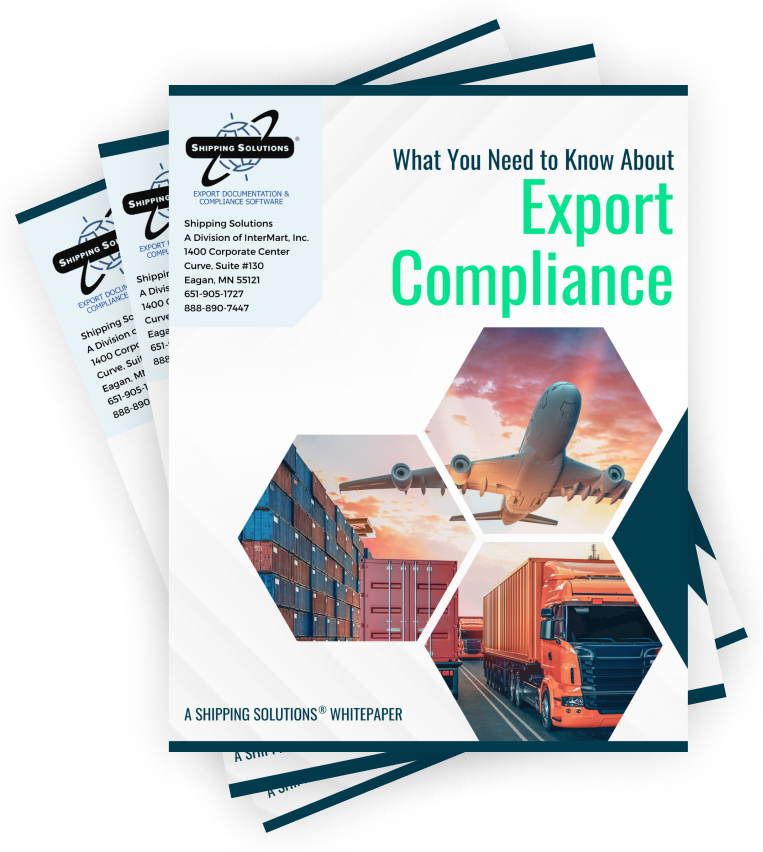The International Trade Blog Export Compliance
Products Subject to U.S. Export Regulations
On: November 16, 2020 | By:  David Noah |
5 min. read
David Noah |
5 min. read

In today's global supply chain, it's rare for a product to come entirely from one place. Unless you’re a farmer who’s planting seeds grown in the U.S. and harvested from your own land or a miner who's extracting elements from the earth, it’s likely that your goods contain parts from multiple countries or that you make a part that is one piece of a larger good.
For this reason, it’s crucial that you determine which of your parts and finished goods are subject to U.S. export regulations. These regulations might make it illegal for your products to be shipped to certain individuals and organizations or to certain countries. In other cases, you may be required to obtain an export license before you, or another party, can ship the goods to a certain destination.
If you or your international partner ignore these export regulations, you could face significant penalties including fines, loss of export privileges, and even jail.
Items Controlled By U.S. Export Regulations
Here are five categories of goods that fall within U.S. export jurisdiction:
1. All Items In the U.S. Regardless of Origin
If a product is in the U.S., it's subject to U.S. export regulations. If you do business here, create a product here, or have a product from another country within the boundaries of the U.S., that product is subject to U.S. regulations.
2. All Items of U.S. Origin
If an item originates in the U.S., it doesn’t matter what country it is in—it is subject to U.S. regulations.
For example, if you can’t ship a good that originated in the U.S. from here to Iran, then you can’t ship it from Saudi Arabia to Iran. Similarly, if your item is of U.S. origin and requires a license to be exported from the U.S., it requires a license abroad. If the party you are shipping to is on one of the restricted parties lists, you can’t ship to that organization or person regardless from where it is shipping.
3. Foreign-Made Items That Incorporate More than de Minimis Amounts of Controlled U.S. Content
Per BIS regulations, if the foreign-made item incorporates more than the de minimis level of U.S.-origin items (more than 25% of the total value of the good), then that item is subject to the EAR.
For example, imagine a European company sells a missile, and 25% of its parts are subject to export controls in the U.S. In this case, because it incorporates more than the de minimis amount, the whole thing is subject to U.S. export regulations.
U.S. companies should be aware that if they’re selling these types of items, they are responsible for interactions made with potential customers. If your customer is buying a controlled item, it is your responsibility to understand what they will do with it and how they will use it. For this reason, you should get written assurance from your potential customer that they will be using your goods according to U.S. regulations.
It is your responsibility to understand the regulations and act appropriately. Find out more about this process in our article, No Bull: Export Compliance Means Watching for Red Flags.
4. Foreign-Made Items Utilizing U.S. Technology
Foreign-made items that incorporate controlled U.S.-origin commodities, foreign made commodities that are bundled with controlled U.S.-origin software, foreign-made software that is commingled with controlled U.S.-origin software, and foreign-made technology that is commingled with controlled U.S.-origin technology are subject to export regulations.
Here are two scenarios: You have a company that doesn’t make gyroscopes, but you have a blueprint for how to make them; or you have a factory that can build gyroscopes cheaper, faster and more accurately. If you provide that blueprint, you are sharing a controlled item. Or, if your European customers come and look at your gyroscope facility, and you share with them how it works, the item you are producing is controlled knowledge (also known as a deemed export).
This second scenario is considered to be an export even though you never shipped a product, and it is subject to the same export regulations as physical items. There’s an incredible amount of information about deemed exports available on the Deemed Exports section of the BIS website that you should reference if you have questions.
We have also written extensively on deemed exports on the International Trade Blog:
- Surprise! You May Be an Exporter without Even Knowing It
- Deemed Exports: Exporting Without Shipping a Product
- Why the Deemed Export Rule Is So Critical: EAR and ITAR
5. Other Certain Narrow Exceptions
There are certain narrow exceptions regarding export regulations that you must be familiar with. The BIS website has an entire section dedicated to EAR, which you should study and become familiar with. Better yet, get some training.
Why Should Exporters Take This Seriously?
If you’re thinking, “It seems like a lot of work to learn how to determine which products are subject to export regulations,” you’re exactly right. It is a lot of work—and for good reason. These regulations protect U.S. interests, and they are to be taken seriously.
Here’s a list of all of the penalties and sanctions you could face for violating EAR. You can find out more about the disastrous consequences of violating export regulations in the BIS publication, Don’t Let This Happen To You!
You can be proactive with your compliance efforts by using the right tools. Shipping Solutions Trade Compliance Software can help you meet your exporting responsibilities quickly and affordably—from restricted party screening to export controls to product classification. They are incredibly helpful and can save you from the consequences of non-compliance (and you can get a free subscription to try them out and see for yourself!).
This article was first published in July 2015 and has been updated to include current information, links and formatting.
Like what you read? Subscribe today to the International Trade Blog to get the latest news and tips for exporters and importers delivered to your inbox.

About the Author: David Noah
As president of Shipping Solutions, I've helped thousands of exporters more efficiently create accurate export documents and stay compliant with import-export regulations. Our Shipping Solutions software eliminates redundant data entry, which allows you to create your export paperwork up to five-times faster than using templates and reduces the chances of making the types of errors that could slow down your shipments and make it more difficult to get paid. I frequently write and speak on export documentation, regulations and compliance issues.


